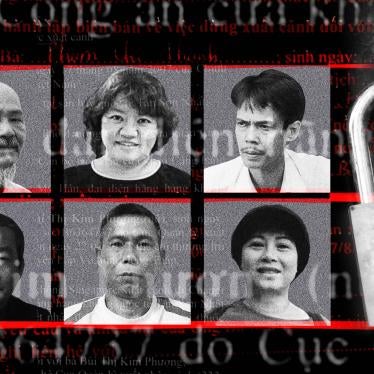Sophie Richardson, Asia Advocacy Director for Human Rights Watch spoke to The Fresh Outlook's Foreign Affairs reporter, Emma Wilson, about politically motivated arrests of bloogers in Vietnam.
Emma: What do you think about Vietnamese authorities keeping Nguyen Hoang Hai in prison past his expected release date?
Ms Richardson: Nguyen Van Hai (known by his pen-name Dieu Cay) was clearly not punished for tax evasion. He was detained by the police several times before the arrest for participating in protests against China and for forming the Club of Free Journalists. He was arrested right before the Beijing Olympic torch passed Ho Chi Minh City and there was discussion among bloggers for yet another protest. Members of a special police unit responsible for monitoring and intervening in political cases carried out his arrest on charges of owing back taxes on a rental property he owns, which was a baseless pretext to punish him for his political activism.
There are several reasons the authorities want to keep him in prison. Dieu Cay was extremely influential among dissident bloggers, especially a group of bloggers in the South who became fragmented after he was put in jail. If released, he would become a magnet and unifying force for bloggers - something the government did not want to see right before Party Congress.
Secondly, other members of the Club of Free Journalists have not stopped their criticism of the government since Dieu Cay's arrest. The authorities want to shut down the whole group and thus started with the arrest, and then prolonged imprisonment, of Dieu Cay and the latest arrest of Anhbasg (Phan Thanh Hai), who were both founding members of the Club.
Emma: Even more bloggers and activists have been arrested this week. Are these arrests politically motivated in your opinion?
Ms Richardson: The arrests of bloggers and activists are definitely politically motivated since these peaceful activists and bloggers have been vocal in criticizing government policy. The most recent politically-motivated arrest was of dissident writer Vi Duc Hoi - a member of Fatherland magazine (founded by a group of Vietnamese dissidents). He was arrested on October 27 and will be detained for four months pending further investigation. Two others arrested this week (Tien Phong journalist Phan Ha Binh who wrote under the pen name Ha Phan; and blogger Nguyen Le Huong Tra, who blogged as Co Gai Do Long) were not dissidents per se, although we would still consider their arrests as politically-motivated since they reflect internal struggles among different factions within the Party.
Emma: Why do you think these arrests have been made?
Ms Richardson: Before an important event (such as the Party Congress), the authorities routinely attempt to silence dissenting voices.
Emma: What do you think about the timing of these arrests right before the US state visit?
Ms Richardson: There has been a pattern in which police round up and detain, or put under house arrest, many dissidents before international events take place in Hanoi, so that foreign journalists cannot talk with them. This has happened time and again.
Emma: How many "politically motivated" arrests have been made this year?
Ms Richardson: It is hard to say - in Vietnam, where the government controls the press, many politically motivated arrests take place far from the public spotlight, for example Montagnards in the central highlands was arrested for belonging to independent house churches that the government does not approve of. The three labour rights activists sentenced to prison this week were arrested last February. However, their arrests were not known to the international media for months, since they were held incommunicado, without access to lawyers or their families, during most of their pre-trial detention period.
Emma: What should be done about these arrests?
Ms Richardson: Vietnam's bilateral donors should call on Vietnam to release peaceful dissidents and reform its laws that criminalize free expression, censor internet usage, and restrict freedom of association and assembly. Influential donors such as Japan, the EU and the US should more closely link trade and aid relations with Vietnam to improved respect for human rights.
Sophie Richardson is Advocacy Director in the Asia Division of Human Rights Watch.






